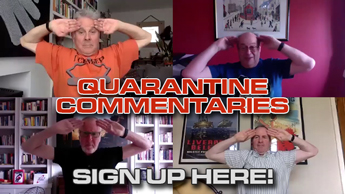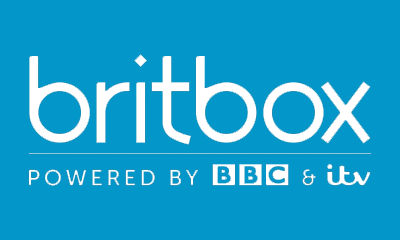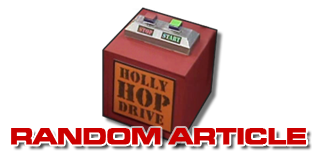 |
Mr Flibble Talks To... James Hendrie The co-writer of Series VII's Nanarchy pops by for some penguin action. |

Andrew Ellard
Mr Flibble, forever trying to sell his action-penguin screenplay, wanted to know how James got started WRITING professionally...
When I left school I went to Emmanuel College Cambridge, studying Classics, where I dabbled with Footlights for a while with limited success. The stars at the time were Robert Bathurst, Hugh Laurie, Stephen Fry and Emma Thompson so the competition was pretty tough.
In my final year, I wrote a revue with a friend which we performed in the college bar. The Oxford Revue Company were performing in Cambridge and someone invited me to what we'd now call 'the after party'. There I met Tony Sarchet and Nick - then Jon - Revell who wrote the revue but were regular writers for Radio 4's Week Ending. Nick told me to send our stuff to the producer at the time, Paul Mayhew-Archer. So for the next few weeks we sent in a page of one-liners.
The first week we had one joke broadcast. The next week - nothing. Or the next week. We thought our careers were over. My co-writer went off to become a barrister and, because there wasn't much call for Freelance Classicists, I decided I'd have to persevere with this writing business. Eventually I got a two-minute commission and went on to write on other radio shows. I got noticed by Paul Jackson who gave me my first TV commission on Three of a Kind, a BBC1 sketch show starring Tracey Ullman, David Copperfield and Lenny Henry. After that, one job pretty much led to another: Carrott's Lib, The Lenny Henry Show, Alas Smith and Jones, Spitting Image...
Which Rob and Doug were a huge part of, of course. What are your abiding memories from working on SPITTING IMAGE?
I found it very enjoyable. Every week the writers would travel out to Dockland Studios, which was basically a sophisticated Portakabin - the massive pyramid-capped skyscraper had yet to be built at that point. And then we'd all go to a nearby pub and have drinks and discuss the week's news.
As I remember the late Geoffrey Perkins, the producer at the time, would be in charge. Also present were Paul Mayhew-Archer, script editor, and the writers, Ian Hislop and Nick Newman, Jack Docherty and Moray Hunter, Paul Simpkin and, I think, Andrea Solomons, Tony Sarchet and me. Then when we were all too drunk to think, the sketches would be allotted. It was much like the Week Ending weekly routine, plus puppets and drink.
As far as I recall, Rob and Doug had moved on to other things - possibly Red Dwarf - by the time I had joined the team. I seem to remember I had been asked to join Spitting Image while they were in charge but for some reason I couldn't do it.
Mr Flibble drew James' attention to the social commentary within his screenplay - a penguin on the police force being a clever way to discuss prejudice within a mainstream context. Andrew suggested ignoring him, which proved successful. James: How did you first get involved with GRANT NAYLOR PRODUCTIONS?
I had known Rob and Doug more or less since I had started in radio and had been fans of their writing since Cliché - let alone Son of Cliché. We'd worked on a few of the same programmes (Radio 2's The News Huddlines, Three of a Kind, Carrott's Lib) and I knew they liked my stuff. Eventually they asked me to write a script for a series they were developing called The OO-EE-OO Dimension, a sort of comedy Twilight Zone. Sadly it never got made, because it would have been brilliant. After that they asked me to write for The 10%ers.
The 10%ers won the Comedy Award for Doug's episode, Table 11. It was a bigger success at the time than maybe people realise. But how did it work, was there a writers' room?
There wasn't a writers' room in the American sense. As far as I was concerned, any pitches that were made were written paragraphs. From these Rob and Doug would pick the front runners and then I'd go in to discuss them. Then we'd decide on which one I'd write.
At that stage Rob and Doug's partnership came to an end. Was it a hard writing process with all that going on?
Not at all. I was unaware of any split or any friction. Mind you, this could be down to borderline Aspergers...
There were a lot of changes for the second series - a main character was replaced, Ed Bye came on board as director, one-time M*A*S*H writer John W. Regier joined as a writer and producer...
Yes, by series two it was clear that Rob was no longer involved. John Regier was great, very intuitive and story-led. Ed Bye was very good news, great to work with, very can-do. In fact, my last two projects with the BBC had Ed as director.
Your episodes were A Small Package ('womaniser agent gets saddled with a baby') and Runner ('the agency hires a blind runner'). How do you feel about those stories now?
Do you know, I can't remember that much about the actual scripts apart from the basic story lines. Were they any good? I've got the feeling that A Small Package was funnier but Runner was better, for some reason.
Runner had, I thought, some really strong writing for the blind guest character - did that come from research?
Not really. I just thought it would interesting to write about a physically-challenged character who everyone assumed was some sort of saint, but wasn't.
Was it a natural progression from that show to Red Dwarf for NANARCHY?

I guess - in the sense that Doug was again looking for outside writers and I had fulfilled the brief before. Also, I think it helped that I'd previously written a science-fictiony script for them, for The OO-EE-OO Dimension.
I've loved science-fiction since I was a kid. My natural leanings are towards SF, Fantasy and the weird. The episode I wrote and directed for Murder Most Horrid was SF-ish So it wasn't that difficult. What I'd find difficult is writing soaps or kitchen sink drama.
As I recall, I submitted a page of one-line ideas. The only other one I can remember involved a kind of hoop which acted as a teleportation device. I think I envisaged a comedy chase sequence with our gang jumping through the hoop and ending up on a different planet every few seconds. Naturally, the budget for this would have been tremendous. The naivety of youth...
As I remember the nanobot idea was immediately seized upon as a 'goer' by Doug. Nano-technology was very much in the air at the time and I think there'd just been a Horizon on Eric Drexler and his ideas, which fired my imagination. I remember I wrote an outline which actually showed the nanobots interacting and had them talking to each other. I think this was nixed - quite rightly - as being too complicated and taking the focus away from our main characters.
I think what I had written, bearing in mind I haven't read it since it was submitted, was a rather poignant and sad piece about a fellow who'd lost his arm - which understandably was not what Red Dwarf needed at that point!

You can read about the original draft here. So what happened next? You weren't available to continue rewriting, is that right?
Yes. I was busy on something else, I'm not sure what. At the time I was splitting my time between the U.K. and America so it's possible I was away.
I think about the first third [of the episode is significantly] mine and the rest is a combination of my work with Doug's and Paul Alexander's. The final programme works in the context of the whole RD story and leads into the next series very well. Perhaps it's a bit of a leap that the nanos were able to recreate the whole starship and all its crew - but it certainly revitalised the show for the next series.
Mr Flibble suggested James might like to take his penguin-cop-on-the-edge action-comedy to his friends in TV. That James gave a polite "Hmm, maybe" speaks volumes of the diplomacy required to work in TV, and led Andrew to ask about the nature of making COMEDY NOW.
I feel there are fewer people in positions of power who are interested in scripted comedy - scripts being slow to write and expensive - which explains the preponderance of 'shiny floor' shows and stand-ups on panel shows.
The writing of sitcoms is more or less the same. I think the 'American' style of room-writing is something that could be explored more, having worked like that on the early series of My Family. It lends itself to long runs and more joke-intensive comedy. But it has been more or less abandoned over here. Again, due to expense. I don't think even My Family does it any more.
What are you working on right now?
With my longtime co-writer Ian Brown I have a couple of sitcoms in with the BBC awaiting decisions. We also have a two adventure/thriller/crime dramas in development. And a film script... but hasn't everyone?.
Mr Flibble enjoyed talking to James, and now that it's over... Mr Flibble is very cross.














